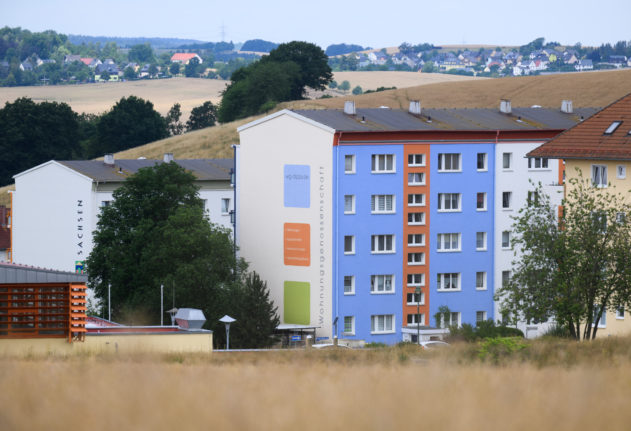Finding somewhere to live in Germany sure isn’t easy at the moment.
Though many experience the problems with the rental market, the real estate market is currently in a crisis too caused by a steep rise in costs of building materials and higher interest rates, which mean that people cannot afford to build houses anymore, and investors don’t want to build.
READ ALSO: How high interest rates are hampering homeowners' dreams in Germany
New figures from Germany's Statistical Office show that only 21,000 apartments were approved for construction in June, a drop of 31.5 percent compared to the same period last year, or 9,600 fewer apartments.
Meanwhile the real estate giant Vonovia declared last week that they are delaying the construction of 60,000 apartments due to a lack of investment and increased costs. Germany’s record drop in house prices may mean that investors think the profit margins are not worth investing.
READ ALSO: Why does Germany keep missing its house building target?
Can a housing summit solve the crisis?
So the government has declared a housing construction summit (Wohnungsbaugipfel) for Monday to try and make things easier for this beleaguered sector, inviting 30 different industry groups to meet with Olaf Scholz and construction minister Klara Geywitz, both of the Social Democratics (SPD), in the Chancellor’s office in Berlin.
This comes ahead of state elections in Bavaria and Hesse where the governing “traffic-light” parties of Social Democrats, Greens and Free Democrats aren’t expected to do well.
“The creation of affordable housing is one of the most pressing social issues of our time” is how the public statement stating the key policy points starts, according to public broadcaster ARD’s politics department, who received a copy in advance.

Easier qualification for loans
One of the key measures will be raising the maximum annual income limit for families to qualify for a discounted loan through the state bank KfW from €60,000 to €90,000 for a family of three, Tagesschau reported on Monday.
The maximum amount available to be given as a loan has also been raised by €30,000 to €170,000 at an annual interest rate of just half a percent. This will mean that more families will be able to afford to build or buy their own energy-efficient home.
Due to the high costs of new energy-efficient insulation, under the old standards this financial relief program had only had 245 applicants since it was launched in June, with German construction minister Klara Geywitz telling Tagesschau “we are therefore improving the funding conditions and making the program more attractive.”
Robert Habeck, the climate and economy minister from the Green party, has already declared ahead of the summit that he will delay plans to introduce new requirements for the better EH40 standard of insulation, which would have meant that new builds only use 40 percent of the energy of other buildings.
“The introduction of the Building Energy Act ensures that new buildings will have climate-friendly heating from 2024. That's why I no longer think it is necessary to quickly introduce the new EH 40 standard” Habeck told Reuters news agency.
“In the amendment to public procurement law planned for 2024, we will therefore ensure that sustainability criteria are implemented in a less bureaucratic, simpler and therefore better way," he added.
Construction experts had argued that the additional insulation standards would have been expensive without the benefit of saving much energy.
The German government still back reforms at a European level that put “demanding quotas” for renovating and upgrading building stock but will not make this compulsory for individual homes.
More funds for social housing
Germany’s 16 states will be provided with €18 billion to build social housing, and cities such as Munich and Berlin which have extremely high demand for housing should be allowed to reform planning laws to make building affordable housing easier and faster.
The Green Party leader Ricarda Lang has also called for a €30 billion investment program to go directly to the construction industry, which itself has called for a stimulus package of €50 billion.
New 'climate bonus'
The government also aim to introduce a “climate bonus” to encourage homeowners to swap their gas and oil boilers for new climate-friendly heating systems, as demanded by Chancellor Scholz’ government’s controversial heating law.
Tax breaks for offering affordable housing
Following a suggestion by Kevin Kühnert, the SPD’s General Secretary, the government will introduce a non-profit housing law that will give tax breaks and addition funding to landlords who consistently offer affordable housing. Germany had non-profit housing until 1990 when it was abandoned federally after a corruption scandal.

Comments